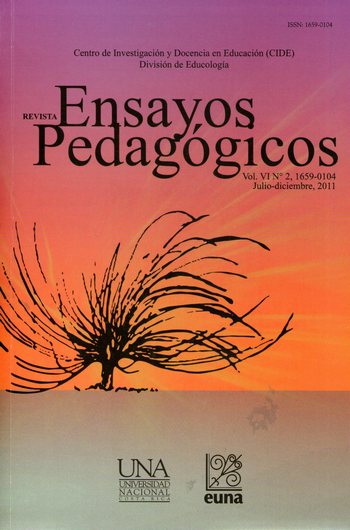Affective filter influence on students' initiating the b.a. english major at the Universidad Nacional, Chorotega branch in Nicoya, Guanacaste, Costa Rica
DOI:
https://doi.org/10.15359/rep.6-2.11Keywords:
language acquisition process, young adult learners, affective filterAbstract
Affective filter is a commoly accepted component in foreign language learning for adults, are internalized emotional barriers frequently established by learners as a way of psychologically protecting them when confronting the challenge of producing the target language Krashen (1987). With this natural defense mechanism is attempting to help the individuals from damaging their egos, it is in fact counter-productive to the language learning process. This qualitative study explores and describes the negative impact of affective filters in a group of entrance level, young adult students at the Universidad Nacional, Chorotega Branch campus in Guanacaste, Costa Rica. In addition, it tests some strategies in lowering the affective filter in this particular group. The results showed that there was a significant impact in how affective filter delimit the learning process and the need for professionals in the field of language learning to address this issue especially in the beginning of the language acquisition process.
References
Dulay, H. et al. (1982). Language two. Nueva York: Oxford University Press.
Krashen, S. (1981).Second language acquisition and second language learning. Oxford: Pergamon Press.
Krashen, S. (1987). Principles and practice in second language acquisition. EnglewoodCliffs, New Jersey: Prentice-Hall International.
Hernandez, S., at al. (2006).Metodología de la investigación. Mexico: McGraw-Hill.
Lara, E. et al. (2006). “El adulto joven”. Recuperado el 17 de abril del 2008. disponible en http://www.avizora.com/publicaciones/psicologia/textos/adulto_joven_0015.htm
Manson, T. (2002). “Affectivefilter”. Recuperado el 15 de setiembre de 2009, de http://www.timothyjpmason.com/WebPages/LangTeach/Licence/CM/OldLectures/L11_Affective_Filter.htm
Norris-Holt, J (2007) “Motivation as a Contributing Factor in Second Language Acquisition”. The Internet TESL Journal, 7, (6).
Osses, S. et al (2000). “Investigación cualitativa en educación: hacia la generación de teoría a través del proceso analítico”. Recuperado el 27 de octubre de 2008. Disponible en http://www.scielo.cl/scielo.php?script=sci_arttext&pid=S0718-07052006000100007&lng=es&nrm=iso&tlng=es
Oxford, R. (1990). Language leaning strategies: what every teacher should know. United States: Heinle&Heinle Publisher
O’ Malley, J. &Uhl, A. (1995). Learning strategies in second language adquisition. New York: Cambridge University Press.
Rossiter, M. (2003). “The effects of affective strategy training in the ESL Classroom”. Teaching English as a Second or Foreign Language, 2 (7).
Stevens-Long, J. (1979). Adult life: Developmental processes. Palo Alto, California: Mayfield Publishing Company.
Yule, G. (1996). The study of language. Cambridge: Cambridge University Press.
Yang, A (2005).“How self-esteem and anxiety affect second language learners. Researchpaper”. Recuperado el 20 de agosto de 2010. Disponible en it.snhu.edu/EFL-537/yangyating/Research%20Paper.doc
Schutz, R. (2007).“Stephen Krashen's Theory of Second Language Acquisition”. Recuperado el 03 de mayo del 2010. Disponible en http://www.sk.com.br/sk-krash.html
Downloads
Published
How to Cite
Issue
Section
License
Ensayos Pedagógicos is subscribed to the Attribution-NonCommertial-NoDerivatives 4.0 International Creative Commons Licence, which allows both authors and readers to freely download, store, copy, and distribute the final approved publisehd version of the manuscript (post-print) as long as this is done without commercial purposes, no derivative works are generated, and the source and author are mentioned. As well, Ensayos Pedagógicos declares that authors will remain the rightful owners of the copyrights of their work in perpetuity.







